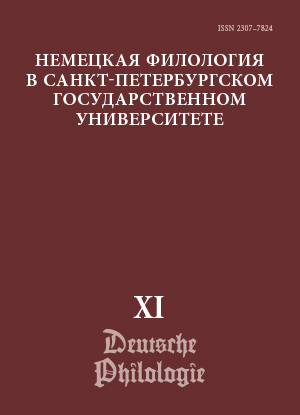Contextual actualization of the author in a scientific text: ethnolinguistic analysis (on the material of German and Russian linguistic articles)
Abstract
This article is devoted to the problem of ethnolinguistic analysis on the contextual actualization of the author in scientific communication. The category of authorization, as well as the mechanisms of its formation represent one of the lines of communicative and pragmatic content of the scientific text. The material is based on German and Russian articles on linguistics from authoritative scientific journals. The universal functional and stylistic features of scientific style can be influenced by socio-cultural and ethnic mind, which is clearly evident in the contrastive analysis of scientific articles. Various types of linguistic means are included in the verbalization of the author’s actions in the process of scientific argumentation. Four main cognitivesemantic mechanisms of implicit authorization were chosen for ethnolinguistic analysis: frequent units with anthroponymic semantics, classes of words with egocentric semantics included in textual statements, contexts with potential dialogicality of specific types interrogative sentences, contexts with a deliberate violation of semantic agreement. Both languages are considered in conjunction with the space of real communication, which has a direct impact on the construction of the text and the selection of lexical and grammatical units. Behind these units there is an active actor, which can be interpreted as the researcher in the contexts of scientific communication. Thanks to the modus components, the main content is modified and connected to the situation of communication. For this reason, the ethnolinguistic differences are mostly explained in terms of cultural features and traditions.
Keywords:
ethnolinguistics, scientific communication, text pragmatics, context, authorization, implicitness, German language, Russian language
Downloads
References
Литература
References
Downloads
Published
How to Cite
Issue
Section
License
Условия передачи авторских прав на статьи и рецензии, опубликованные в ежегодном периодическом издании «Немецкая филология» регулируются условиями Лицензионного Договора автора с Санкт-Петербургским государственным университетом. В соответствии с Лицензионным Договором опубликованные материалы находятся в открытом доступе, а авторам бесплатно предоставляется неограниченные возможности их распространения и самостоятельного архивирования.




